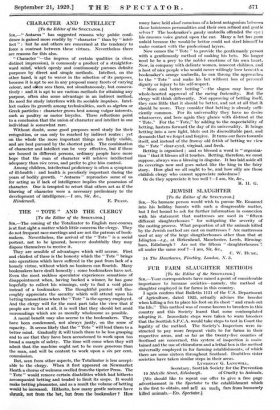THE " TOTE " AND THE CLERGY [To the Editor
of the SPECTATOR.] .
SIR,—The coming of the Totalizator to English race-courses is at first sight a matter which little concerns the clergy. They do not frequent race-meetings and are not the patrons of book- makers. Nevertheless, the arrival of the " Tote " is a social portent, not to be ignored, however doubtfully they may dispose themselves to receive it.
They are sensible of advantages which will accrue. First and chiefest of these is the honesty which the " Tote " brings into operations which have suffered in the past from lack of a homely virtue, without which no business can flourish. Many bookmakers have dealt honestly ; some bookmakers have not. Even the most reckless speculator experiences sensations of disappointment when, having backed a winner, he has gone hopefully to collect his winnings, only to find a void place instead of a bookmaker. The thoughtful punter will tho- roughly appreciate the security which will attend upon his betting transactions when the " Tote " is the agency employed. And the clergy will for _the most part take the view that if people are to bet at all, it is well that they should bet amid surroundings which are as morally wholesome as possible.
A moral benefit may also accrue to the bookmakers. They have been condemned, not always justly, on the score of rapacity. It seems likely that the " Tote " will lead them to a better mind. Gradually it will teach them to be less grasping and to see that they have been accustomed to work upon too broad a margin of safety. The time will come when they will admit that the machine ought not to be more generous than the man, and will be content to work upon a six per cent. commission.
But, seen from other aspects, the Totalizator is less accept- able to the clergy. When it first appeared on Newmarket Heath a chorus of welcome swelled fromthe tipster Press. The " Tote " would remove certain disabilities which had hitherto accompanied betting and tended to limit its scope. It would make betting pleasanter, and as a result the volume of betting would be increased. Hitherto, how many gentle natures have shrunk, not from the bet, but from the bookmaker How many have held aloof conscious of a latent antagonism between those boisterous personalities and their own refined and gentle selves ? The bookmaker's gaudy umbrella offended the eye his raucous voice grated upon the erre. Many a bet has gone unlaid because the would-be bettor could not steel himself to make contact with the professional layers: Now comes the " Tote " to provide the gentlemanly persori with a gentlemanly method of making his bets, No longer need he be a prey to the nobler emotions of his own heart Now, in company with delicate women, innocent children, and a host of nice people who would never willingly bow beneath a bookmaker's orange umbrella, he can throng the approaches to the " Tote " and make his bet without loss of personal dignity or injury to his self-respect.
" More and better betting "—the slogan may have the whole-hearted approval of the racing fraternity. But the clergy will think differently. Not approving of betting itself, they care little that it should be better, and not at all that it should be more. They consider that betting is already suf 1. ciently common. For its universality they have no desire whatsoever, and here again they glance with distrust at the " Tote." For the " Tote," by adding to the respectability of betting, hastens forward the day of its universality. It brings betting into a new light, blots out its discreditable past, and demands that we forget and forgive. It turns our faces towards itself, and instead of the frowsy old fetish of betting we view the " Tote " clear-eyed, virginal, and fresh.
Betting is organized ; and so blessed a word is " organiza- tion " that it blesses all it touches. Betting, therefore, we must suppose, always was a blessing in disguise. It has laid aside all its coverings now and goes naked like the king in the fairy story. How glad we all ought to be, and how silly are those childish clergy who cannot appreciate nakedness I
Or do they appreciate it too well ?—I am, Sir, &c., R. H. G.












































 Previous page
Previous page